Archive for the 'words' Category
Saturday, November 29th, 2014
Just south of the Lions Park out of Manilla, NSW, someone has painted a bearded face on a tree.

It’s the first of eight such faces (that we know of), all taking advantage of the contours of the burls. The second one, named Toby by my nephew though it looks more like Gromit, is my favorite.
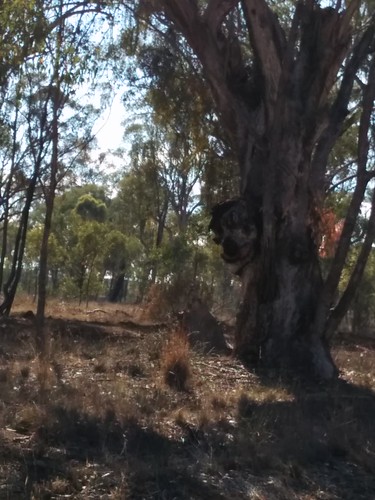
Before this trip to Barraba I tried to describe to myself the difference between my father’s town of a thousand souls and my own beloved city of San Francisco, population 800k but arguably way fewer souls. There are the giveaway jokes: Barraba used to have an asbestos mine, and just missed out on a new abattoir. In New York, everyone’s writing a novel; in LA, they’re working on a screenplay; in SF, they’re building an app.
That second joke gave me a clue. I love the density of narrative in cities, the plaques on London’s Georgian houses, the ghost of the railroad through the Mission, the undergrounded waterways. I thought for a while that Barraba is relatively empty of stories, until I remembered with a stab of sorrow that it used to be full of them, but that my ancestors tried to kill all the people that knew them.
Barraba is in Gamilaraay country. One story I do know is that of the Myall Creek Massacre.
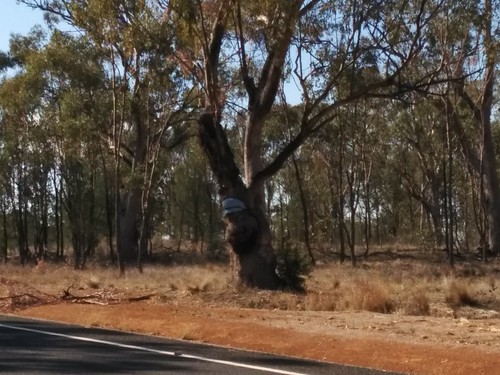
I’ve spent enough time in Barraba to have made good friends and learned a little of their stories. Pam has a great one about her husband Ted riding across a flooded creek to be with her when she had a baby; she remembers the sight of him galloping up to the house, surrounded by a halo of flies. Jane’s family owns a property called Wiry, which I had assumed was an Aboriginal name. Turns out it was part of the land grants to returned soliders, and because it’s a relatively hilly and inaccessible property, the recipient grumbled “Wouldn’t it root ya.” More giveaway jokes.
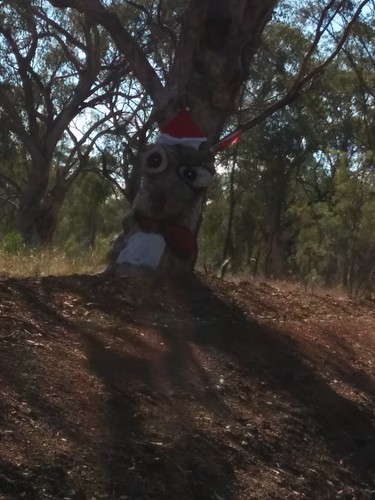
Jane asked me flat out what all seven of you remaining blog readers have probably been wondering: “Are you neglecting the blog because the stuff you’re thinking about is too intense and sad?” Yup. But something really terrific has happened. A researcher has become interested in Dad’s blog, which was critical to his diagnosis of semantic dementia. We have 17 years’ worth of his written records as his condition developed – more than five times the length of the next longest case study. Joanna believes we can extract psycholinguistic markers of the changes to his vocabulary that may help scientists to develop more sensitive diagnostic tests.
As part of collating the material for Joanna, I read a few of Dad’s earliest blog entries. He had a decent line in giveaway jokes of his own:
Tue 10 Feb 1998
Got away late from Sydney. Lasted on the road until 6 o’clock at which time we found ourselves in Gunning, between Goulburn and Gundagai.
Gunning is a town of a thousand souls and very few outstanding features.
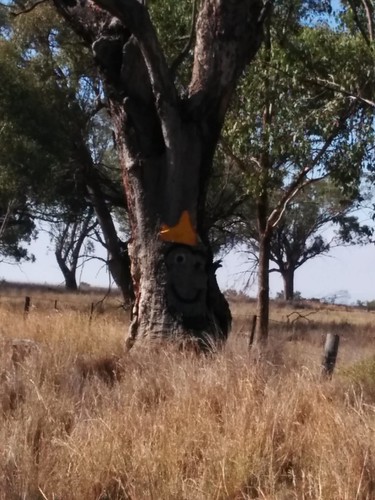
Death is the eater of meaning. It swallows up whole universes, erases stories from the landscape.
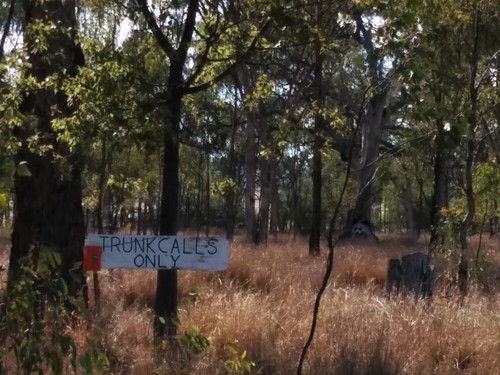
The work of grief is to make sense of loss. We have to make new narratives to mark the place of those that are gone.
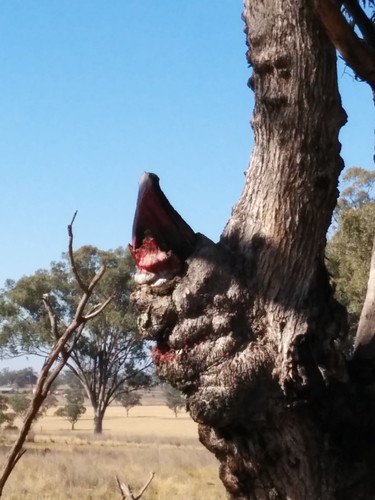
We have to find the faces in the forest.
Posted in adventure time, australia, bookmaggot, grief, history, hope, mindfulness, politics, san francisco, sanity, words | Comments Off on the forest of faces
Tuesday, March 11th, 2014
…luxury always comes at someone else’s expense. One of the many advantages of civilization is that one doesn’t generally have to see that, if one doesn’t wish. You’re free to enjoy its benefits without troubling your conscience…
It seems very straightforward when I say “I.”
…when I look closer I seem to see cracks everywhere. Did the singing contribute, the thing that made One Esk different from all other units on the ship, indeed in the fleets? Perhaps. Or is anyone’s identity a matter of fragments held together by convenient or useful narrative, that in ordinary circumstances never reveals itself as a fiction? Or is it really a fiction?
I spent six months trying to understand how to do anything—not just how to get my message to the Lord of the Radch, but how to walk and breathe and sleep and eat as myself. As a myself that was only a fragment of what I had been, with no conceivable future beyond eternally wishing for what was gone.
It’s hard for me to know how much of myself I remember. How much I might have known, that I had hidden from myself all my life.
Posted in bookmaggot, grief, meta, mindfulness, words | Comments Off on ancillary justice, by ann leckie
Tuesday, September 3rd, 2013
I find a note she wrote me:
“For Rachel
Gwen Harwood
Poet
Bone Scan”
She doesn’t even remember writing it.
I look it up and find:
In the twinkling of an eye,
in a moment, all is changed:
on a small radiant screen
(honeydew melon green)
are my scintillating bones.
Still in my flesh I see
the God who goes with me
glowing with radioactive
isotopes. This is what he
at last allows a mortal
eye to behold: the grand
supporting frame complete
(but for the wisdom teeth)
the friend who lives beneath
appearances, alive
with light. Each glittering bone
assures me: you are known.
Posted in grief, little gorgeous things, mindfulness, sanity, words | Comments Off on sorting through mum’s stuff
Saturday, July 27th, 2013
I kinda wanna copy out the whole first chapter, but will restrain myself somehow –
As I grew up, everything started getting grey and dull. I could still remember the amazing intensity of the world I’d lived in as a child, but I thought the dulling of perception was an inevitable consequence of age – just as the lens of the eye is bound gradually to dim. I didn’t understand that clarity is in the mind.
On Gifted And Talented Education (GATE) as the gateway drug to being a massive douche:
I tried to resist my schooling, but I accepted the idea that my intelligence was the most important part of me. I tried to be clever in everything I did.
On school as trauma:
My ‘failure’ was a survival tactic, and without it I would probably never have worked my way out of the trap that my education had set for me. I would have ended up with a lot more of my consciousness blocked off from me than now.
On the importance of writing about something other than what one has read – ironically, the exact opposite of what I am doing here:
I had expected that there’d be a very gentle gradation from awful to excellent, and that I’d be involved in a lot of heart-searching. Almost all were total failures – they couldn’t have been put on in the village hall for the author’s friends. It wasn’t a matter of lack of talent, but of miseducation. The authors of the pseudo-plays assumed that writing should be based on other writing, not on life.
On aging disgracefully:
I began to think of children not as immature adults, but of adults as atrophied children.
Reminds me of something – what was it – oh right –
Not in entire forgetfulness,
And not in utter nakedness,
But trailing clouds of glory do we come
From God, who is our home:
Heaven lies about us in our infancy!
Shades of the prison-house begin to close
Upon the growing Boy…
Posted in hope, the empty space, words, worldchanging | Comments Off on impro, by keith johnstone
Friday, December 21st, 2012
I didn’t have a fantastic year in reading, to be honest – I think the Kindle threw me off and that my patterns of acquisition and consumption have yet to rebalance. Here are some books I read that I liked very much:
Nonfiction
Fiction
I guess it wasn’t such a terrible year in reading at that. There are two books, though, that I want to push into your hands in an overbearing yet adorkable bookseller-or-librarian-ish way: Constellation Games and Fair Play. Please read these books. They are very great.
It feels like cheating to recommend Leonard’s book when I have known and loved Leonard for ten years, but I must have read Constellation Games four times this year and gotten something more out of it each time. It’s a first contact novel and an existential love story and it did more than any other single argument to make me believe games are an important art form, but it’s also incredibly funny and moving and Curic the two-souled purple otter is my new favourite fictional character. For its part, Fair Play is about two seventysomething women living at opposite ends of an attic having conversations about pictures and books. Yes, Tove Jansson is the Moomin person. This book is based in part on her life with her wife.
Why these two? Because I am 41 years old. Because I love animals and nature and am living through a mass extinction I helped cause. Because I am a pacifist living in America, and a progressive anarchist who spent my teens as an evangelical Christian assuming I would die in a nuclear holocaust. Because for my first quarter-century I was much troubled by despair. It’s only in the last decade or two that I have had the luxury of time to tinker with my diet and my neurochemistry and my cognitive behavior to try to make a habit of hope and not horror. Because it’s the Northern winter solstice and that means all the festivals of lights, all the songs and candles in the long darkness, and what all the festivals mean is that physics is real: this will be the longest night of the year, and that tomorrow at dawn one shaft of sun will light up the corbel-vaulted room inside Newgrange [or insert your neolithic solar calendar of choice]. And then everything will start to feel a little bit better. It doesn’t stay dark. As Bill Bryson says, life wants to be. Life doesn’t want to be much. From time to time, life goes extinct. Life goes on.
Constellation Games and Fair Play are quite literally stories of friendship and hope, not in the movie trailer way that makes you wince but in a clear-eyed, fearless way that is able to talk about betrayal and jealousy and irreconcilable differences and the cold empty vastness of space. They are both, in fact, books about how to be a friend, and how to be hopeful. We are chimpanzees with doomsday weapons, adrift on a rock in an immense dark void. We have to take care of each other and we have to believe that things can change for the better. So, you know. RTFM.
Posted in bookmaggot, friends, fulishness, hope, mindfulness, sanity, words, worldchanging | Comments Off on books of the year: stories of friendship and hope
Thursday, August 16th, 2012
I picked this up because one of the Rumpus bloggers read it in the Australian coffee shop in Brooklyn that Matt took me to – what? That’s cromulent! – but no one told me it was an AIDS memoir.
The Last Time
The last time we had dinner together in a restaurant
with white tablecloths, he leaned forward
and took my two hands in his hands and said,
I’m going to die soon. I want you to know that.
And I said, I think I do know.
And he said, What surprises me is that you don’t.
And I said, I do. And he said, What?
And I said, Know that you’re going to die.
And he said, No, I mean know that you are.
Oh, and also a love letter to her brother, two things which separately and together are bound to make me verklempt. I miss them, the AIDS dead. I imagine another mentor or two, acid-tongued, politically astute, fond of my children. The other books Paul Monette would have written, Kenny Everett’s late night talk show, Freddie Mercury’s kickass performance at the Olympic opening ceremony in London, the rest of Derek Jarman’s films. Fuck.
Nothing for it but my best Zen life hack: pretend you are travelling back from the future to see that person you loved one last time.
Posted in bookmaggot, grief, words | Comments Off on what the living do, by marie howe
Wednesday, August 15th, 2012
Marr is Australia’s best journalist right now, as far as I can gather. He is acute on both what makes us different…
David Malouf has a wonderful theory that it’s the English we carried in our baggage that makes America and Australia such different places. In the early seventeenth century, settlers took to America a language of abstractions: “Passionately evangelical and utopian, deeply imbued with the religious fanaticism and radical violence of the time, this was the language of … dissenters … who left England to found a new society that would be free, as they saw it, of authoritarian government by Church and Crown.” Malouf argues that by the time Australia was colonised, the language had changed. What the First Fleet brought here “was the language of the English and Scottish Enlightenment: sober, unemphatic, good-humoured; a very sociable and moderate language; modern in a way that even we would recognise, and supremely rational and down to earth”.
…and what makes us boringly the same as everyone else.
Wherever the Tampa tactics lead Australia in the years to come, those of us in the City Recital Hall yesterday will remember the sight and the sound of a white, prosperous audience baying for border protection. They know it’s the winning ticket and John Howard has found it for them. He is a genius of sorts: he looks this country in the face and sees us not as we wish we were, not as one day we might be, but exactly as we are. The political assessment is ruthlessly realistic. Only the language is coy. But who has ever admitted to playing the race card?
Posted in australia, bookmaggot, politics, ranty, words | Comments Off on panic, by david marr
Wednesday, May 30th, 2012
Yes, they are both meditative middle-aged memoirs by great lesbian writers. Both dramatize the writer’s complicated relationship with her mother and both name-drop Woolf and Winnicott all over the damn place. And YES YOU HAVE TO READ THEM BOTH. I don’t care. Cancel your calls.
Henry James did no good when he said that Jane Austen wrote on four inches of ivory – i.e. tiny observant minutiae. Much the same was said of Emily Dickinson and Virginia Woolf. These things made me angry.
I love them at least in part because the NY Times gave Bechdel a shitty review that boils down to “These women! How dare they think their inner lives are interesting?” Therefore reading these books is exactly the same as jabbing a burnt stick into the eyes of the Four Boresmen of the Aborecalypse (Mailer, Bellow, Roth and Updike. Could those guys HAVE more cockish names?) And if that doesn’t make you want to read them I don’t know what will.
I was very often full of rage and despair. I was always lonely. In spite of all that I was and am in love with life.
I remember curling up in Books Upstairs in Dublin, right outside the gates of Trinity College, and reading Dykes to Watch Out For like it was going to save my life. I can’t have been in Ireland for more than a week. And I never connected with Winterson in the same way; I’ve never even seen Oranges. But this book! This book. It took me apart.
I know these are ways of surviving, but maybe a refusal, any refusal, to be broken lets in enough light and air to keep believing in the world – a dream of escape.
Posted in bookmaggot, ireland, sanity, women are human, words, worldchanging | Comments Off on why be happy / are you my mother
Saturday, January 14th, 2012
We’ve been back in Sydney for a week. I’ve been working and trying to get the kids to do their independent study, all while missing my family sorely. We had a few sunny days but lots of blustery windy ones and now, humidity and rain. Hi, Sydney.
Ugh! None of that. Good points of Sydney include the fantastic playground with the huge water feature in Centennial Park, with a cafe right next door; Nielsen Park, which is one of my favourite places in the world; and Rushcutter’s Bay Park, which also has a yummy cafe and a vast playground, and back from which we have just come.
Yesterday I got up early and flew to Melbourne for the inaugural AdaCamp, which was excellent and lots of fun. It’s a feminist unconference with the goal of promoting the participation of women in open tech and culture. The sessions were lively and the women were clever and funny and insightful. Best of all was getting to spend solid time with Skud.
Skud maintains that I am a larval Melburnian. Her argument is cogent. She’d chosen the venue for the conference, Ceres, which is basically Ecotopia and which pushed all my tech-hippie buttons. I want to go to there! Oh wait! I already did.
I flew back to Sydney twelve hours after I flew down. My Kindle was almost out of battery, so I ransacked the terminal’s sadly atrophied bookstore twice before finding, on the bottom shelf, the last copy of Mark Dapin’s new novel, The Spirit House. WIN. It is funnyangry and brilliant and you should all read it.
Today we scattered Ric’s ashes, and I don’t know what to say about that.
Posted in australia, grief, mindfulness, women are human, words | Comments Off on primarily updatey in nature
Monday, October 10th, 2011
I came across a notebook the other day with this written on the back:
JULIA FIZHARDING
A GIRL
HER BUK
SHE ROTE IT
THIS IS HOW YU RITE MI NEM
J-U-L-I-A
Posted in children, little gorgeous things, they crack me up, words | Comments Off on lighter reading
Friday, September 16th, 2011
This post on Cool Tools changed my life. I drive more than I should. I drive to the barn two or three times a week. I drive the kids to swim class and piano class and summer camp. I used to suffer grievously from road rage, on account of California drivers zomg! But since I started listening to audiobooks while I drive, my driving has become serene and Zen.
As KK says in his Cool Tools post, fiction and history are ideal. Well, as those of you with even a fleeting acquaintance with me will have gleaned, reading enough fiction is not my problem. My problem may indeed be reading too much fiction. But history is harder. It’s hard to read history after a long day at work and with the kids, with your head heavy on the pillow. I thought I’d test-drive audio books with some history I had tried and failed to get through in print. That’s how I managed to race through Georgiana and, even more dauntingly, Paris 1919. I got both from the San Francisco public library, on CASSETTE TAPES HOW STEAMPUNK. Then I had a vicious slapfight with the SFPL’s bitterly disappointing audiobook reserves (foul proprietary software with almost nothing available for Android.)
So I signed up for Audible and listened to Bloodlands and Postwar streaming off my phone. They are both beautifully read by Ralph Cosham, who sounds almost exactly like Kerr Avon. Which was odd, but compelling. The books are twins in so many other ways that I suspected Timothy Snyder and Tony Judt of knowing one another’s work even before I Googled them to learn how intimately they were connected. Both books consider Eastern and Western Europe as parts of a whole. Bloodlands considers state-sponsored mass killing by Nazi Germany and Soviet Russia as two distinct expressions of a single totalitarian impulse. Postwar examines the aftermath. I was very lucky with the order in which I tackled them. Bloodlands picks up where Paris 1919 leaves off, and Postwar does the same for Bloodlands.
Postwar is one of the best and wisest and most useful books I have ever read in my life, and I am a Judtist now. I’ve been praising it as the missing manual for the world in which I grew up, but it’s more than that. Judt – a reformed Marxist – takes pains to distinguish between Soviet communism, which succumbed to its genocidal totalitarian impulses, and Scandinavian-style social democracy, which didn’t. He is also clear-eyed yet hopeful on Europe itself as a model for organizing human beings that is neither coercive in the Chinese model or cynical and corrupt in the American way. Judt, who died of ALS last year, would not have been the least bit surprised about Greece and Portugal and the peril in which the Euro finds itself: he read the writing on the wall. But in spite of much of the evidence of his own eyes he argues for the continuing usefulness and relevance of social contracts that don’t inherently fuck people over, or arrange to have them killed. So that’s nice.
By contrast, my latest project is Lawrence Wright’s The Looming Tower. It’s a history of Al Qaeda, beginning in aftermath of World War Two. Narrator Alan Sklar is no Ralph Cosham, and until I cast him in my mind as my friend Bob Foster the genius Koreanist from Michigan, his flat Midwestern vowels seemed set to drive me up the wall. I am glad I persisted, because The Looming Tower is an Iain Banks Culture novel, with the West standing in for the Culture. Specifically, it is Consider Phlebas, because it concerns itself with the point of view of the enemies of the Culture.
The big question of the last century appears to be: “Why do you want me dead?”, for various values of “you” and “me”. All the answers are depressing. The Looming Tower follows Sayyid Qutb, the father of Islamism, as he studies education in Greeley, Colorado: founded as a Western utopia. Qutb is so horrified by people tending their gardens and women talking about free love that he turns against America altogether. It is as compelling and awful as a car accident. As Jeremy remarked: “This is why we can’t have nice things.”
The more I read history the more I hope to stay as far the fuck away from it as I possibly can.
Posted in bookmaggot, history, words, worldchanging | Comments Off on i listen to history books in my car
Tuesday, August 2nd, 2011
Brilliant and chilling. A timely reminder that weird women (such as myself) should never get in any position where other people have power over us.
Borukhova’s contained, Cordelia-like demeanor at the defense table worked against her. Nothing came of nothing. “She had no emotion,” Jones said. “She didn’t seem upset. She wasn’t scared. If you’re innocent and being tried for murder, you’d be upset.”
Be exactly like everyone else, or suffer for it. Malcolm’s book is precision-engineered to afflict the comfortable. She is as troublesome as Helen Garner (high praise.) She’s also acute on class and privilege and their expression:
Whether to reflect the grandness of the Times or in accordance with a personal code, Barnard dressed differently from the rest of us. She wore interesting, beautiful dresses and skirts in contrast to the uninteresting jeans and corduroys and sweaters that Gorta and Bode and Pereira and I wore. Her sharp-eyed stories about the trial were as pleasing as her elegant clothes; not the least of the pleasure we took in them was the knowledge that Judge Hanophy would be irked by them.
Recommended to those with an interest in justice, women or writing.
Posted in bookmaggot, women are human, words, worldchanging | Comments Off on iphigenia in forest hills, by janet malcolm
Wednesday, July 27th, 2011
The Pony Club Manual – second draft
The New International Version – first draft
Awful – notes
The Great Gamgee
Rivendell Revisited
Posted in words | Comments Off on works in progress
Monday, May 16th, 2011
It is a truth universally acknowledged that a girl in possession of a retirement-level liquidity event must be in want of a tax shelter.
Posted in bookmaggot, fulishness, words | Comments Off on possible first line
Wednesday, January 5th, 2011
…my novel fragment is twice the length it was when I left California.
Ten thousand words down, seventy thousand to go.
Posted in words | Comments Off on as of tonight
Monday, December 27th, 2010
Words: 500. This is hard.
Posted in first world problems, words | Comments Off on implausible, &c, day 2
Wednesday, March 17th, 2010
When I met her in Sydney in January my childhood friend Anna asked if I still believed in God, and I said “Oh, no,” which felt at the time and still feels like an evasion (and also unfairly dismissive.) That said, I still don’t have anything well-formed to put in its place, though, so consider these notes towards… um, something? Maybe a provisional explanation of why the Hubble Ultra Deep Field helps me to be happier, more compassionate and more mindful of my own death.
In her fantastic Somewhere Towards the End, Diana Athill says:
People of faith so often seem to forget that a god who gives their lives meaning too often provides them with justification when they want to wipe out other people who believe in other gods, or in nothing. My own belief – that we on our short-lived planet are part of a universe simultaneously perfectly ordinary in that there it is and incalculably mysterious in that it is beyond our comprehension – does not feel like believing in nothing and would never make me recruit anyone for slaughter. It feels like a state of infinite possibility, stimulating and enjoyable – not exactly comforting, but acceptable because true. And this remains so when I force myself to think about the most alarming aspect of what I can understand, which is that we will eventually become extinct, differing from the dinosaurs only in contributing a good deal more than they did to our own fate. And it also remains so when I contemplate my personal extinction.
Recessional puts it this way:
Innocence looks at the stars and says “look at the lights of the gods in heaven! I am in awe.”
Experience says, “Eh, it’s just burning gas lightyears away. I’m bored.”
Grace says, “look at the burning gas lightyears away! I’m in awe.”
Posted in i love the whole world, mindfulness, sanity, words | Comments Off on also epona, goddess of horses, helps me find parking
Tuesday, March 16th, 2010
Last night’s turnout included a Rachel, a Rebecca, a Naomi and an Elizabeth. We need to recruit a Mary or an Eve so we can start a Biblical Heroine Fox Force Five.
Posted in friends, fulishness, words | Comments Off on or maybe salome
Monday, March 15th, 2010
Me: “I’d like to write a writing group. ‘Have you thought about writing it in the first person?’ ‘I think your story really starts on page 9.'”
Liz: “The poetry group would be ‘Why don’t you make it rhyme?’ or ‘I think you should replace every third word with the word after it in the dictionary. To make it more postmodern.'”
“People really say that?”
“Yes.”
“Don’t they have medication for that?”
Later I read out a line of dialog and Liz says “I have to show you a woman I know who writes really good dialog.”
“Are you saying my dialog is shit?”
“No!”
“I’ve had a quarter of a glass of wine so I’m paranoid. WHAT OF IT?”
Naomi: “They do have medicine for that.”
Liz silently hands me chocolate.
“There’s some dialog I would have liked to have written.”
Posted in friends, fulishness, words | Comments Off on monday night writers (with drinks)
Saturday, November 1st, 2008
I decided to do Nanowrimo for the first time in a few years. My novel is called “The New International Version”, and it takes the form of two LiveJournals. Masochists and the more indulgent of my friends can follow them here:
TrueLoveKnots
Doctor Proudie
Posted in words | Comments Off on also nablopomo! all rach all the time






